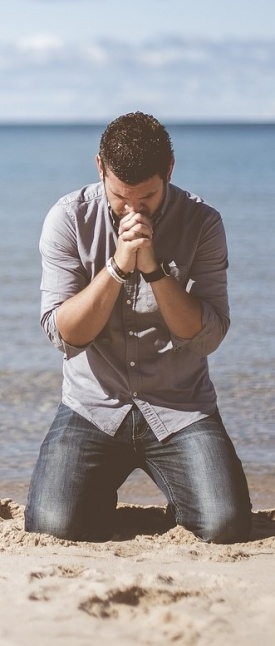Editor's Reflections: The Holy Spirit and Our Free Response
“If we can nurture in a [person] the emergence and the victory of spiritual liberty, we have accomplished our task. If not, all is lost and the Christian life will weaken into childishness; it will harden into formalism; and finally it will disappear.” —Jean Mouroux, From Baptism to the Act of Faith
Encountering God in Catechesis
Testimony 1: Lessons from Hallmark
I taught religion to the whole middle school, from sixth to eighth grades. I was also the homeroom teacher to the sixth-grade boys for most of the years I taught there. I was always on the lookout for anything I could use for my boys or for teaching in general. One evening at the convent, we watched a Hallmark movie, and I walked away with a one-line golden nugget that the Holy Spirit told me to write down for my boys: “A boy with courage grows up to be a man with courage.” I wrote it on my board the next day, and it stayed up all year long—and for all the years following. When the boys made good decisions like telling the truth, owning up to their mistakes, or encouraging each other, I would say something like, “Praise the Lord! I’m so proud of you. A boy who owns up to his mistakes will become a man who will take responsibility for them as well.”
. . .
Testimony 2: Am I a Missionary Disciple?
I was freaking out. I had been asked to give my first talk to the high school youth group, a group of about eighty teens. It was a talk on being a missionary disciple, and I didn’t feel like one. Mostly because I had recently graduated college and come into the Church through RCIA, and so most of my experience of the faith up to that point had been very “mountaintop,” full of consolation. But for the past two years, I had also worked a job as a waitress—a job I had started while still in my undergraduate studies and which was now my full-time job. This work environment that would consume hours of my day could make it very challenging for me to live like Jesus. Foul language, even a culture of sexual harassment, was everywhere. Though I wasn’t swept up entirely into all the sinful behaviors, it could be suffocating at times.
A popular saying that was making its way around social media was “bloom where you are planted,” but I felt as if I was wilting. Now I was supposed to give a talk on how to bloom, and I felt as if I didn’t know what that was like! Luckily, I had ties to a good community, and the overwhelming advice of my sisters and friends was to go to prayer and ask Jesus to show me where he had been working. So, that’s what I did.
. . .
Encountering God in Catechesis: The Power of Prayer
 My husband and I met George a few years ago through Marriage Encounter. He was a navy pilot. While his wife was Catholic, George was not religious. We were George and his wife’s prayer couple during their weekend
My husband and I met George a few years ago through Marriage Encounter. He was a navy pilot. While his wife was Catholic, George was not religious. We were George and his wife’s prayer couple during their weekend
Encountering God in Catechesis
For Communion
Growing up Protestant, sacraments seemed fairly irrelevant to me. It was not until I turned fifteen that I decided to get baptized because I knew that if I accepted the terms of what baptism meant, by Protestant standards, then I needed to truly accept Christ and all that it meant to follow him. As a Methodist, I always wanted to be in the right mindset for communion and not take for granted what I was partaking in. When I met my husband, I recognized that his Catholic beliefs were particularly important to him. As he explained to me the sacredness of the sacraments, especially the Eucharist, I admired his passion and love for seeing Communion in such a beautiful way—even if I did not see it that way myself. When we got married, I attended my first Easter Vigil in 2019. I had already gone to adoration with him a few times and found praying in front of the Eucharist to be such an impactful experience with Christ. At the vigil, I saw the catechumens and candidates partaking in their first Eucharist, and I was in such awe. All these people were willingly accepting the initiation rites of what the Church was asking of them. Now, they were receiving what they genuinely believed was the Body and Blood of Christ and joining with him in such a special way. The view in front of me was of such beauty, I considered what it would be like to be so close to Christ in receiving him in the eucharistic feast. I wondered: could I be closer to Jesus than ever before?
Encountering God in Catechesis
Several years ago, I was working as a parish Coordinator of Youth Ministry, and one of my responsibilities was teaching a high school religious education class. The class was arranged by the parish DRE and met as part of her programming each Wednesday night. There was no set textbook or program. We had a wide range of topics and materials available, and we were able to move as the class needed. The class was comprised of a diverse range of students with varying backgrounds and levels of catechetical formation. Mid-year, a new family moved to the parish. The parents only spoke Spanish, and they had two sons in high school who had very little formal religious education.
The older of the sons was in eleventh grade. He didn’t speak much. I’ll refer to him as “Frank.” You could tell by what few personal stories he shared that Frank’s life was a hard one. He lived in a bad neighborhood. He adored his parents, who were hard-working, but recognized that they were consumed by the preoccupation of the family business and were also not as devout as they expected their children to be. The boys completed that school year and came back the following fall.
Encountering God in Catechesis
I was born and raised Catholic, with a family who went to Church every week. I also went to Catholic schools, so the faith was constantly around me. Yet, growing up, I just wanted to fit in. I wanted to be popular, I wanted people to talk about me like they talked about the other girls. And all my life, I always felt like I was going to have to try harder to get people to like me because I wasn’t pretty like the other girls. I got teased a lot for what I looked like—it was always something in the back of my head in everything I did. Not good enough, not thin enough, not pretty enough. So, I told myself since people weren’t going to like me for what I looked like, I had to make them like me for something else. I let my friends make all the decisions, decide who we liked and didn’t like, who I’d invite to my birthday party, what I’d post on Instagram, and everything else. And I had this idea in my head that once I got them to like me for what I’m not, I could go back to being the real me and then they’d like me for that too. What I didn’t know back then is when you stand on the edge of a cliff, the longer you stand there, the more comfortable you become. And once you’re comfortable with being on that edge, it’s that much easier to fall.
The Spiritual Life: Encountering the Joy of the Holy Spirit
 A cascade of trees flowed down the hillside towards the water, a body of water that was bigger than a pond but not quite a lake, on the lands belonging to the Holy Ghost Fathers in southern Connecticut.
A cascade of trees flowed down the hillside towards the water, a body of water that was bigger than a pond but not quite a lake, on the lands belonging to the Holy Ghost Fathers in southern Connecticut.
Encountering God in Catechesis
The work of catechesis, like any aspect of the Christian life, calls for great trust. In fact, Bishop Robert Barron’s book And Now I See speaks of the process of metanoia (conversion), signifying an internal shift to a mind governed by trust in God rather than fear.
Encountering God in Catechesis
Whenever I’m about to make a big decision, I always jokingly remind my friends “It’s my job to knock on all the doors; it’s God’s job to open one.” All my life, I have found this to be true. God allows me to run around pursuing opportunities, and then he simply opens the right door. The beauty of the workings of God in our lives is that he knows us so well.
The Door Will Be Opened
I walked along the forbidden streets of one of Philadelphia’s most crime-ridden neighborhoods while being greeted respectfully by neighbors. They knew I lived at the church and, despite countless warnings about the safety of this community, I encountered only joyful faces. One of the first conversations I had as I walked from the El station to the church rectory, where I lived with other young adults, was with a seven-year-old girl, who asked me: “Is God a father and Mary a mother?”
Yes, Mary is a mother, and she is the mother of all of us; she is Comforter of the Afflicted and Refuge for Sinners. She is Mother of Divine Grace and Mother Most Pure. Her mission as Mother continues in the world today, through the Church.[1] This is why we turn to the Church in time of need—we bring our spiritual, material, social, and emotional needs to the Church.
“The church has always been here,” another man explained to me, “but the doors were always locked. No one was there.” It was as if our neighbors intrinsically knew that this grandiose, beautiful building that stretched up to the heavens was meant to be their saving grace; that they should be able to look to the church in time of need and find comfort (Is 66:13); that they should be able to knock and have the door open unto them (Mt 7:7).


